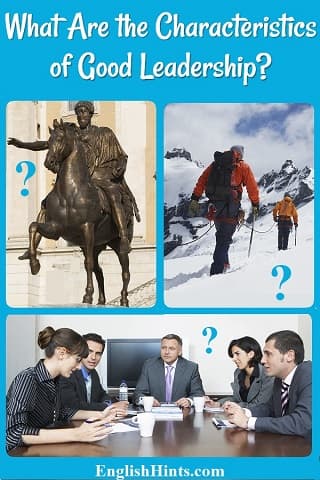Characteristics of Good Leadership
What are the most important characteristics of good leadership? It's a big topic! Leadership has been important from the beginning for the survival and success of human societies.
Leaders have guided their families and tribes from hunting together to organizing communities and building cities and nations. They’ve inspired their people, united them, protected them from danger, (and sometimes led them in attacks on other groups!)
Business leaders have different tasks and goals than military, religious, or political leaders, but they all require many of the same character traits.
What Enables Leaders to Inspire Greatness in Their Teams?
Why are some leaders able to motivate their people to achieve great things, even against obstacles that seem impossible to overcome?
How do they inspire the loyalty that makes their followers willing to suffer or even die for them?
What makes them different from other leaders who struggle to get cooperation, or whose teams don’t accomplish much, or even refuse to work together?
Here are some characteristics that are important in leaders:
- courage—a willingness to risk self for the sake of the group, & a willingness to take action in spite of risks
- confidence, even boldness (but not rashness) combined with prudence: knowing when it’s time to act & when to wait
- vision—an understanding of the big picture & the greater good, not just a part of it, or one’s own corner
- foresight-- the ability to foresee danger & problems
- determination—a willingness to keep doing what needs to be done in spite of difficulties
- intelligence & ability to plan, analyze risks, problems, & opportunities and choose the best course of action
- ability to command the allegiance & obedience of others-- and to set an example (to be the first into the battle)
- trustworthiness, so their followers believe they will keep their promises and act for the good of the team, not just in their own interest
- sense of responsibility & care for their followers
- ability to delegate & coordinate the actions of others; to recognize talent (& weaknesses)—to assign tasks to maximize productivity & chances for success & see where each would contribute the most
- humility—a willingness to admit mistakes and to learn from others (The adjective form is ‘humble.’)
For related vocabulary (including some other characteristics of good leadership) see the Leadership Crossword. (Its answers are here.) Also, please add to these characteristics in the Comments. I know I haven’t included everything!
More on the Characteristics of Good Leadership
I found several interesting articles and talks that let you learn and practice leadership vocabulary. The three I chose are inspiring—and useful if you hope to lead a team or if you’re on one.
(The TED talk and podcast have transcripts, so you can listen and then check how well you understood it by reading the message too.)
Leading with "Why"
In a very popular TED talk, Simon Sinek discusses how great leaders inspire action. He talks about how some leaders (and their organizations) explain what they do—what their business is and what they offer. Others explain how they do things.
But the effective leaders and groups start with why they do what they do. He says, “we follow those who lead, not because we have to, but because we want to. And it's those who start with "why" that have the ability to inspire those around them.”
A Leading Business Journal's View
This Harvard Business Review article focuses on the value of humble leaders. (I would never have expected humility to be singled out for praise by one of the most respected business magazines in the world! They present a compelling case for it, though.)
They reported that in a large survey of workers from countries around the world, “we found that when employees observed altruistic or selfless behavior in their managers — a style characterized by
- acts of humility, such as learning from criticism and admitting mistakes);
- empowering followers to learn and develop;
- acts of courage, such as taking personal risks for the greater good; and
- holding employees responsible for results
— they were more likely to report feeling included in their work teams.”
They summarized the survey results: “… our study raises one common, perhaps universal implication: To promote inclusion and reap its rewards, leaders should embrace a selfless leadership style.”
Then it suggests some practical ways to do that:
- being willing to share mistakes,
- listening and promoting dialogue instead of just trying to win arguments,
- admitting not having all the answers,
- & letting others lead too. (They describe it as “demonstrating how to follow.”)
A Great Leader-- & Adventure Story
Finally, for a compelling adventure story as well as a study in a few key characteristics of leadership, listen to HBR’s half-hour podcast about Ernest Shackleton’s 1914-16 Antarctic expedition.
Their ship was trapped in sea ice just before they reached Antarctica. They spent a year and a half there (in the ship and then camped on the ice). They finally escaped with three lifeboats to a nearby island after a very dangerous five-day journey.
Shackleton and a few of the men then undertook an even more dangerous voyage to get help. They were finally able to rescue the stranded men more than two years after they had left England.
In spite of all their hardships and danger, all of that crew survived. Several of them said afterwards that they survived due to Shackleton’s steady leadership and the way he kept their morale up through those very dark months.
If you can, listen to the podcast itself—there’s a lot more to the story.
Related Pages
What's the difference between collaboration & cooperation? Learn & practice words related to teamwork here!
How much of this Political Language do you understand? Learn the vocabulary for argument & compromise.
Use Personality Vocabulary to describe attitudes and personal traits. (It can help you write a better resume or C.V., too!)
Home > How to Learn Professional Vocabulary > Characteristics of Good Leadership
Didn't find what you
needed? Explain what you want in the search box below.
(For example, cognates, past tense practice, or 'get along with.') Click to see the related pages on EnglishHints.
| site search by freefind | advanced |









